Diogenes, the Dog-like Philosopher
Diogenes was born over twenty-four hundred years ago, which is more of a problem than historians like to admit. People didn’t keep great records back then, of course, and not much was written down. Of what was, little has survived to this day. Mostly we wind up relying on ancient (to us) but more recent writings, which we have to hope were based on reliable lost sources. One pitfall there though is that we lose the context of their original source – whether it was a hostile biography or fawning praise, we just don’t know. And worse is that in many cases (especially with a figure as iconic as Diogenes became), they swiftly get co-opted as symbols for whatever the later author wishes to write about. The truth becomes buried. So if the following seems somewhat far-fetched and occasionally overly dramatic, know that there’s a reason.
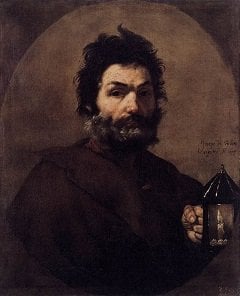
Diogenes was born around 412 BC in the Greek colony of Sinope. It was a wealthy port on the southern coast of the Black Sea, acting as a place for trading caravans from the south to meet with ships and exchange their cargoes. This made the city wealthy, wealthy enough to mint its own coins. Diogenes’ father Hicesias was a banker involved in the Sinopian mint, and Diogenes was originally brought up in the family tradition. At some point the father and son got involved in a plot to debase the currency and mint coins mixed with base metal, and when it was discovered they were blamed for it. Diogenes was banished from Sinope as a result of this. According to one story, he had debased the currency on the advice of the Oracle of Delphi, while another account has it that he received this advice from her after his banishment. Regardless, Diogenes decided that henceforth he would take the advice symbolically. Lies were the currency of political dealing, and those lies were what he would debase.
Diogenes arrived in Athens, according to legend, with a single slave named Manes. However this slave took advantage of the arrival to escape his master. Diogenes didn’t report this, as he is supposed to have said:
If Manes can live without Diogenes, Diogenes can certainly live with Manes.
This is probably an ahistorical way to show his disdain for those who relied on slaves, of course. In the same category is the story that he was the pupil of Antisthenes, the philosopher considered to have pioneered the Cynical approach to philosophy that Diogenes would perfect. [1] Antisthenes taught that virtue was not an inherent quality, but could be learned. Similarly, he said that virtue was the one true nobility. [2] He regarded pleasure as evil, as it drew men away from virtue, and he disdained Plato’s idea of universals. In good keeping with modern scientific thinking, he believed that you could never prove anything, only disprove things – this is where the modern definition of “cynic” comes from. He didn’t take pupils, but the legend has it that Diogenes’ dogged persistence wore him down.
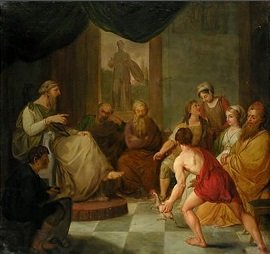
As a non-Athenian, Diogenes would not have been permitted to speak in most of the public halls. His philosophy was not spoken, but was rather the philosophy of the deed. Reportedly when Plato defined man as “a featherless biped”, Diogenes turned up at one of his lectures with a plucked chicken. This was not the only reported run-in between the two. Plato once passed Diogenes washing wild lettuce to eat, and commented “If you had prayed to Dionysus, you wouldn’t be reduced to washing lettuce.” Diogenes replied “If you’d learned to wash lettuce, you wouldn’t have to pray to Dionysus.”
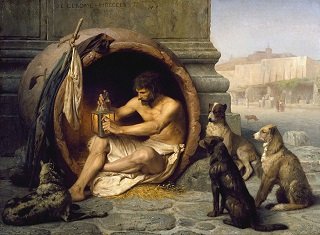
Diogene’s meagre living was legendary. He had asked someone to find a cottage for him when he came to the city, but when the search dragged on he found an old wooden tub down by the river and lived there instead. He claimed to have been inspired to do this by watching a mouse, and realising that it needed none of the possessions that men weighed themselves down with. The creature he was more associated with was the dog, originally as an insult for his uncivilised way of life. One time while he was eating food in the market (a serious social faux pas), onlookers gathered around and shouted “Dog!” at him. Diogenes replied:
It is you who are dogs, for you all gather and stare while I am eating my breakfast.
Diogenes continued to lean into the dog insult, declaring the dog the most virtuous of creatures for its carefree life and instinct for telling friend from foe. Dogs, he declared, neither agonised over the past nor fretted about the future but instead lived entirely in the moment. The word “Cynic”, in fact, derives from the ancient Greek word for “dog-like”. When he was asked why he was called a dog, he replied:
I fawn on those who give me anything, I yelp at those who refuse, and I set my teeth in rascals.
Diogenes also took after the dog in one other respect – his complete lack of embarrassment over performing bodily functions in public. Once when a group of onlookers threw bones to him as they would a dog, he urinated on them. On another occasion, in order to end a conversation with someone who would not leave him alone, he defecated in the street. Some called him “mad”, but he scorned them as being the mad ones, driven insane by their obsession with conventions.
Most people, he would say, are so nearly mad that a finger makes all the difference. For if you go along with your middle finger stretched out, some one will think you mad, but, if it’s the little finger, he will not think so.
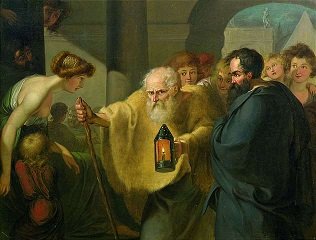
Diogenes had a low opinion of his fellows. Once when seeing a petty thief being led away by temple officials, he commented that the great thieves were leading away the little thieves. On another occasion, he saw a young man cleaning himself and dressing up fancy. Diogenes told the man that if he was dressing up to impress other men he was a fool, and if it was to impress women he was a knave. Diogenes himself made no secret that he dealt with his own sexual impulses through masturbation. When he was chastised for doing so too publicly, he replied that he wished it was so easy to cure hunger by rubbing his belly. He was most famous for a more tasteful eccentricity. He would carry a lit lantern with him as he walked around the city during the day, and if asked why, would declare that he was fruitlessly searching for an honest man (or in some versions, for a “real person”).
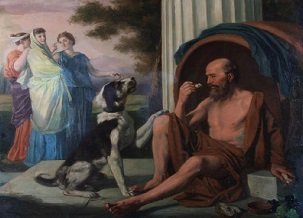
Diogene’s influence came mostly from those who followed his teaching after he died – the aforementioned Cynics. This influence was magnified when Zeno of Citium developed the philosophy of Stoicism the following century, a philosophy based strongly on Cynicism. To the Stoics, Diogenes was considered one of the epitomes of good behaviour. A man living at peace with and in harmony with his own virtuous nature. When Stoicism was adopted by the Romans, they developed a great deal of the symbology around Diogenes – the dogs, the lantern, and so on. When the artists of the Italian Renaissance were rediscovering their Roman heritage, Diogenes became a popular subject for paintings and for allegorical writing.
After spending several decades in Athens, around 350 BC Diogenes (now in his sixties) left to visit the island of Aegina, a former rival of Athens which had gone into decline. [3] It was only a seventeen mile trip, but on the way his boat was attacked by pirates and he was taken prisoner. Initially the pirates treated their captives brutally and didn’t feed them, but Diogenes rebuked them and asked what farmer would treat his livestock so? Hearing this the pirates relented and treated them better. When they reached Crete Diogenes was put on sale in a slave market. When asked where he was from, he replied “I am a citizen of the world”. When asked what he was skilled at, he replied “Governing men”, and then pointed at a man in the front row. “Sell me to him, he looks like he needs a good master.” The man in question, a Corinthian named Xeniades, was impressed enough by Diogenes’ wit that he did actually buy him as a tutor for his sons. Diogenes did such a good job that Xeniades gave him his freedom, and Diogenes found Corinth enough to his liking that he stayed there until he died.
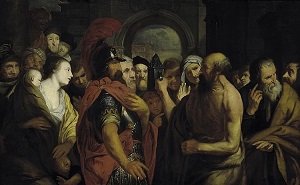
It was in Corinth that Diogenes met the legendary leader Alexander the Great. The meeting apparently took place in 336 BC, when Alexander was still proving himself, as this is the only time he is recorded to have visited Corinth. However many versions of the story place it later in Alexander’s career, when he was at the peak of his fame. The most famous version has Alexander going in search of the great philosopher, and finding him dozing in the sun. Alexander introduces himself: “I am Alexander, the great king.” Diogenes replies: “I am Diogenes, the dog.” Alexander offered to grant the philosopher anything he wished, to which Diogenes replied “Move aside then, you are blocking the sunlight.” Alexander was delighted at Diogenes’ lack of pretension, and as he walk away remarked to his attendants “If I had not been Alexander, I would have liked to be Diogenes.”
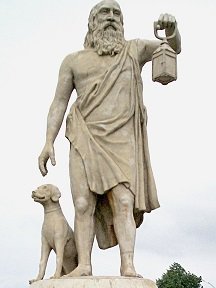
Legend has it that Diogenes and Alexander died on the same day, in 323 BC. It’s probably not true, but it’s a nice touch. He was around ninety when he died, his health clearly not having suffered from living outside in the mild Mediterranean weather. There are different stories of how he died. The most ironically appropriate is that he died from rabies contracted through a dog bite, though a close second is that he committed suicide by holding his breath as he decided his body had deteriorated too far to let him keep his independence. The most prosaic is that he died of food poisoning after eating raw octopus, though it’s possible he simply died of heart failure or any of the other countless ailments we group under “old age”. Those stories that give him time for a deathbed conversation have him ask that his body be left outside the city walls as food for the wild dogs. Whether this was done or not, the city of Corinth erected a monument in his memory – a pillar of marble, with a dog crouching on top of it. Over the centuries to come, the man with the lamp would remain a powerful influence on Cynicism, Stoicism and many other strains of philosophy. Many were prepared to speak their philosophy, but Diogenes was willing to live it – no matter what anyone thought of him.
Pictures via wikimedia.
[1] Mostly due to Antisthenes probably having died before Diogenes arrived in Athens, though there’s also the fact that it’s a little too neat to have one of the the founders of the Cynics learn from the other founder of the Cynics. Especially for later Stoics trying to portray themselves as a more evolved version of Cynicism.
[2] Coincidentally one of my family mottoes.
[3] In a perfect illustration of the problems mentioned above, our sole sources for this whole portion of Diogenes’ life are books written a hundred years later by a notorious satirist named Menippus and a writer named Eubulus. Except they aren’t, as all of the works by both of those writers have been lost (and we don’t even know anything else about Eubulus). Instead, our sole source is a book of “Lives of the Philosophers” which uses those two as its sources. This book was written by a man named Diogenes Laertius and is notorious for its poor citing of sources and tendency towards shallow research – but it’s literally all we have. As such, it’s possible that this entire story about how Diogenes came to Corinth was just a comedy by Menippus, and that Diogenes Laertius didn’t get the joke.
